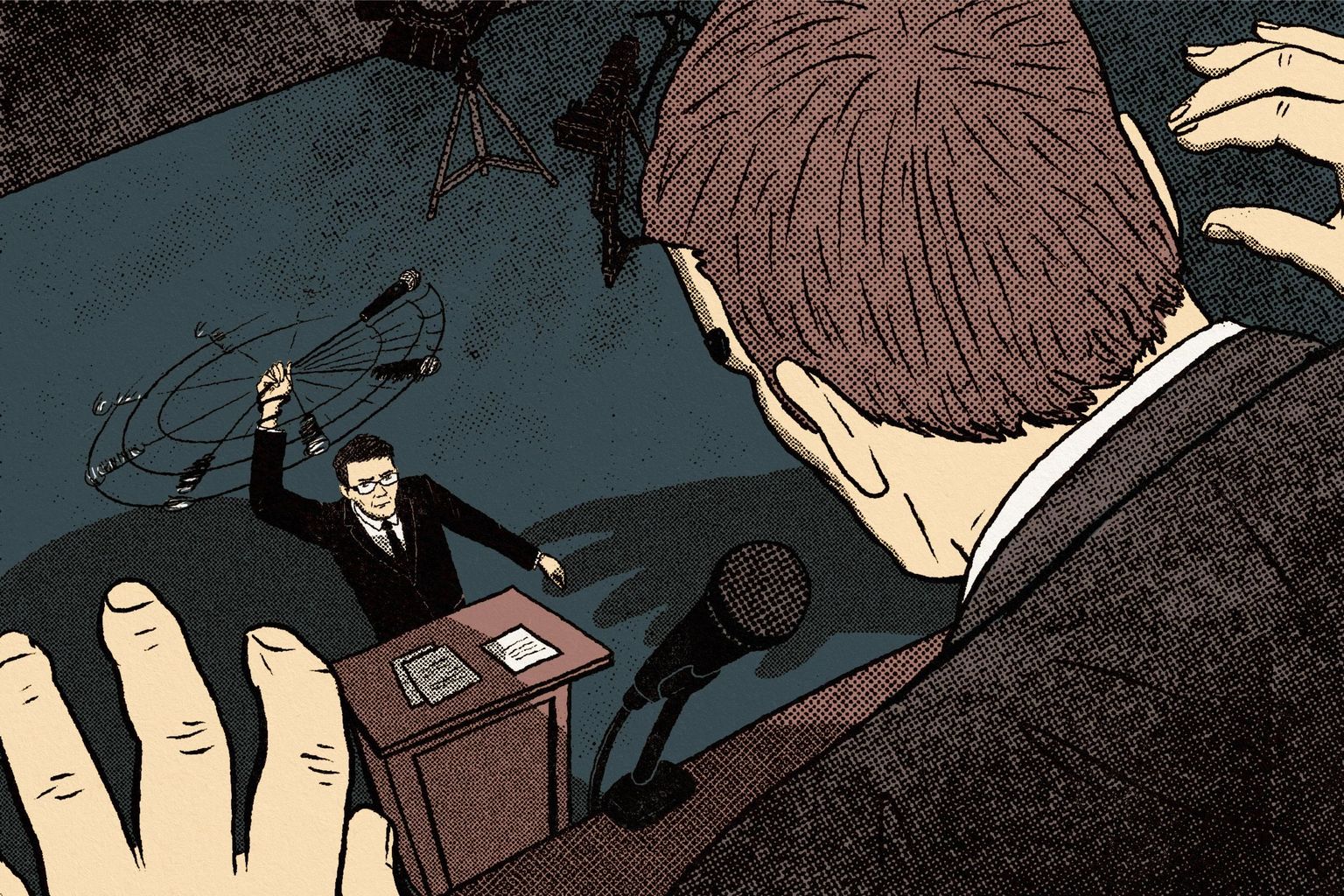The underdog is one of our proudest myths. Here’s why we should kill it.
We all love a battler. But with nearly half the world heading to the polls in 2024, political commentator Andrew Mueller wonders if it's time to put the underdog myth to sleep.

Illustration by Jarett Sitter
If it is not the oldest story in the book, it is at least a story in one of the oldest books: specifically, the First Book of Samuel. In Chapter 17 thereof, an immense warrior named Goliath, the thick end of ten feet tall, wearing a brass helmet and swaddled in armour, steps forward from the Philistine ranks and challenges any among the Israelites camped in the Valley of Elah to come and have a go if they think they’re hard enough.
After an amount of this goading, a young shepherd called David confronts the mighty ogre, armed only with a sling and a handful of stones. Goliath scoffs, but David, undeterred, loads his crude weapon, gives it a couple of momentum-building twirls, unleashes his pebble and—spoiler alert—collects Goliath square in the forehead, killing him instantly.
It is the beginning of quite the career for David, who goes on to become the third king of Israel, uniter of the tribes, conqueror of Jerusalem, etcetera, etcetera. But the story of his success on the battlefield will go on to have an even more profound legacy, giving rise to one of the more pernicious and corrosive fallacies to have ever steered human history: the myth of the underdog.
Three thousand years later, give or take, and our fondness for the underdog is now a cornerstone of western culture and politics. The reasons for this are readily understandable: most of us, even if born into relative comfort and security, will need to struggle and labour to make our way in, and our mark upon, a largely indifferent world. We will often feel that we are up against apparently insuperable opposition of one kind or another, that every win we claim is a triumph over adversity.
We therefore tend to identify with the battler, and to enjoy whatever victories the battler accrues, real or fictional. We watch films where ragamuffin rebels demolish Death Stars, or in which some similarly karmic dynamic is played out (nerd wins cheerleader, crusader defeats corporation—even superheroes who leap tall buildings are routinely depicted tackling apparently superior forces of evil). The popular music we have consumed in the post-World War II period is largely comprised of songs about, and for, the self-styled outsider sticking it to The Man—a characterisation that’s as true of hip-hop and country as it is of rock 'n' roll.
Sport, too, is the domain of the battler. When approaching any contest as a neutral, we yearn to see the long shot get up, even if the long shots are objectively objectionable: at the 2022 World Cup in Qatar, there were global guffaws in the group stages when Saudi Arabia, the mediocre team of one of Earth’s most repressive and unpleasant regimes, upset Argentina, a superb side representing a broadly affable democracy and captained by arguably the greatest player who ever lived.
Nation-states indulge themselves similarly, however prosperous and powerful they may be. When the United Kingdom regards itself, it thinks not of the remorseless empire-builder upon whose fiefdoms the sun never set, but of the dauntless, plucky island staving off the Nazi juggernaut during the Battle of Britain, so many owing so much to so few, and so forth. The United States, by far the mightiest economic, military and cultural force ever gathered beneath one flag, and the assembler of quite the empire of its own, still exults in the self-image of musket-toting American Minutemen blazing dauntlessly away at legions of advancing British Redcoats.
To bring us to the present day, and to more urgent reasons why the proverbial underdog might be overdue exile to the yard, Russia—by some margin the world’s biggest country by area, eleven time zones wide, defended by nuclear weapons and blessed with all the natural and human capital it might have needed to become a constructive and admirable country—has consistently justified its rampage in Ukraine by snivelling that it is bullied and beleaguered. When people convince themselves—or allow themselves to be convinced—that they are the underdog, or that they are at least cheering the underdog on, they are prone to all the follies, failings and felonies of the self-righteous.
Perhaps the underdogs became the underdogs because they just weren’t very good at whatever it is they thought they were doing.
That’s because the underdog, absolving itself of the responsibilities of power, assumes itself to be the good guy by default. When you’re the underdog, every threat is existential; therefore any response is justified. David did not pause, as he picked his spot between Goliath’s eyebrows, to wonder if his foe was bluffing, or frightened, or over-compensating for something, or might not be that unreasonable a bloke if you took the time to get to know him.
This is not, to be clear, a blanket generalisation. Sometimes the overdog is a swaggering, entitled jerk who absolutely has it coming—but we rarely pause, in our sentimental assessment of any squabble, to consider the reasons they are the overdog in the first place, like maybe they’ve been smart, brave and diligent at least as much as they may have been cynical, brutal and ruthless.
Every populist upheaval which has beset the great democracies of the west in the 21st century has pitched itself as the underdog—Brexit in the UK, the Tea Party and Trumpism in the U.S., Five Star in Italy, Marine Le Pen in France—and every such self-styled revolt against the establishment has been in this respect ridiculous, though they have generally been ridiculous in many other respects as well.
The trouble is, we—the voters of the great democracies of the west (assuming that is indeed where you are reading this from)—keep rewarding them. A few years back, a study in the journal Electoral Studies found that political ads that positioned their candidate as the underdog were regarded as more credible by voters—although, and it might be hoped that this would deter people, the effect was notably lessened if viewers thought the candidate physically attractive.
When these self-pitying blowhards win, as they do with vexing frequency, and therefore don’t have an underdog at home, they look elsewhere. This is why Hungary’s preposterous prime minister, Viktor Orban, who has dominated Hungary’s politics for decades and therefore cannot style himself an underdog in his own country, is forever picking fights with the EU and NATO—despite and because of the fact that Hungary’s membership of both organisations gives him the security necessary to strike these defiant, melodramatic poses.
As we have seen—if clearly not learned—when the underdog insurgents do get their way, the results are rarely appetising, which is why they continue, even when in power, to whine that they are being thwarted by greater forces: the media, or the deep state, or whichever sinister cabal of furtive manipulators you’re having yourself. We do not spend enough time considering the possibility that the underdogs became the underdogs because they just weren’t very good at whatever it is they thought they were doing.
The underdog delusion is even more easily debunked in the realm of sport—which, in contrast to politics and culture, has roughly objective measures of success and failure. Consider some of the teams and individuals that have, in recent years, attracted the most fervent ill-wishes of underdog enthusiasts: one thinks of Michael Schumacher in Formula One, the New England Patriots of Bill Belichick and Tom Brady in the NFL, the Manchester United of the Sir Alex Ferguson era in the English Premier League. They won all the time not because they were inherently evil and/or the world isn’t fair, but because they were awesome.
There is, probably, nothing to be done about this. The cult of the underdog is likely a built-in defect of democratic systems which—in most respects nobly—encourage each citizen to have their say, and have a go. Intriguingly, studies of societies which are historically more collectivist—notably China—find much less patience with the idea that the individual confronting the odds is by definition heroic (anecdotally, as well, Chinese people tune into the World Cup absolutely hoping that the Argentinas of this world will administer unto the Saudi Arabias a sound thrashing).
In the western world, however, nobody is going to commission a remake of Star Wars in which the rebels are commanded by vainglorious grandstanders and get thoroughly and deservedly spanked by an Empire which was really only doing its best to protect trade routes and uphold a rules-based Galactic order. (Back on Earth, it is perfectly possible, right now, to find people on social media praising the Houthi pirates of Yemen as if they were Solos and Skywalkers, as opposed to a militia of thugs, fanatics and slave-traders—a leap made possible by the underdog narrative the Houthis themselves have carefully cultivated.) Nor will there ever be a hit record entitled ‘We Are, In Fact, Gonna Take It (While Actually Being On Balance Grateful For Life In A Liberal Democracy, Flawed Though It May Be)’.
David cannot have known what he was unleashing, along with his pebble, those thousands of years ago. But it’s not hard to imagine him in later life, as a divinely ordained monarch, inclining towards a sceptical view of the underdog narrative he inaugurated. Let us hope it is not necessary for the rest of us to embrace totalitarian monarchy to cease proceeding on the default assumption that the weak are right, and the strong are wrong. It is past time that the underdog was muzzled.
